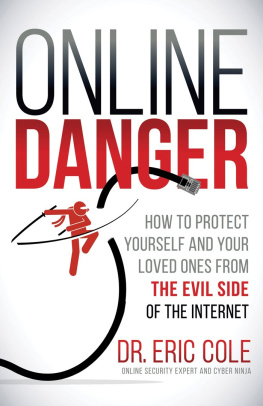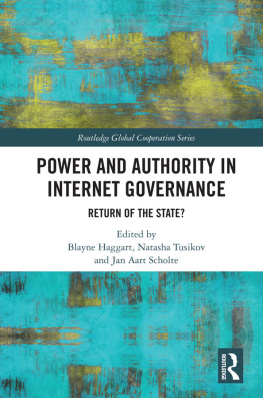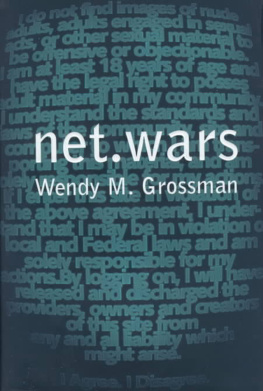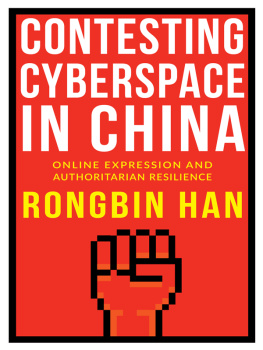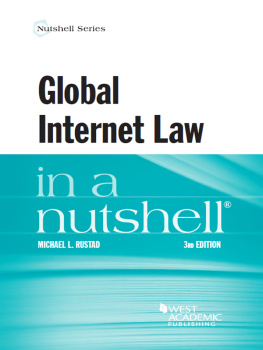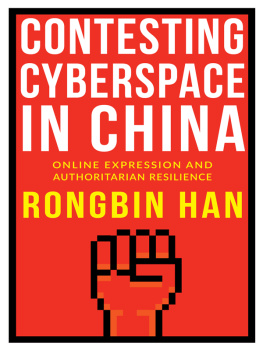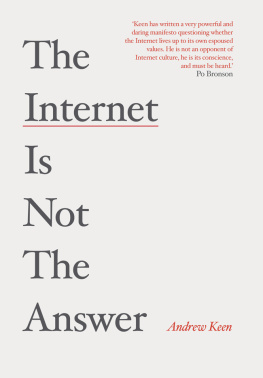From Anarchy to Power
From Anarchy to Power
The Net Comes of Age
Wendy M. Grossman

NEW YORK UNIVERSITY PRESS
New York and London
2001 by Wendy M. Grossman
All rights reserved
Library of Congress Cataloging-in-Publication Data
Grossman, Wendy, 1954
From anarchy to power : the net comes of age / Wendy M. Grossman.
p. cm.
Includes bibliographical references and index.
ISBN 0-8147-3141-4 (cloth : alk. paper)
1. Informational technology. 2. InternetEconomic aspects.
3. InternetSocial aspects. 4. Electronic commerce. I. Title.
HC79.I55 G765 2001
303.48'33dc21 00-012775
New York University Press books are printed on acid-free paper, and their binding materials are chosen for strength and durability.
Manufactured in the United States of America
10 9 8 7 6 5 4 3 2 1
For my mother, Lee Merian Grossman
Contents
Introduction
He used often to say there was only one Road; that it was like a great river: its springs were at every doorstep, and every path was its tributary. Its a dangerous business, Frodo, going out of your door, he used to say. You step into the Road, and if you dont keep your feet, there is no knowing where you might be swept off to. Do you realize that this is the very path that goes through Mirkwood, and that if you let it, it might take you all the way to the Lonely Mountain or even further and to worse places?
J.R.R. Tolkien, The Lord of the Rings
At the beginning of 1997, when I was finishing net.wars , Netscape was the hot tech stock. Amazon.com only sold books and had yet to become a public company. Yahoo! was proud of losing less money than Wired . Freedom of speech activists were waiting for the Supreme Court to overturn the Communications Decency Act. A battle was raging over the deregulation of strong cryptography. And the dancing baby had not yet found stardom on Ally McBeal .
Three years later, as I finished this book, Netscape had lost out and been acquired by America Online; Amazon.com had moved into CDs, toys, consumer electronics, auctions, patio furniture, and hosting small shops; Yahoo!s stock was selling at more than a thousand times its earnings; Wired , split off from its digital arm, had been sold to Conde Nast; and Hampster Dance had hit number one on the Christmas singles list in Britain. The battles over freedom of speech, privacy, and the deregulation of strong cryptography remained the same. And the Internets user base worldwide had tripled.
Many of the big Internet issues from 1994 to 1997 concerned the cultural shift as the Net culture defined by a decade of academic and research use tried to assimilate a massive wave of immigration. In those years, most battles about the Net grew directly out of battles on the Net. There wasnt so much money flying around then, and the businesses that were growingNetscape, the Internet Movies Database, Yahoo!were founded by early Net users who at least understood the Net and began by creating something that would make a difference to the Net community. These days, you find a lot of large companies trying to look Nettish by sticking community buttons on their Web sites while failing to grasp that linking is what makes the Web. Meanwhile, the old-time grassroots activists are busy testifying in Congress or running start-ups rather than bashing things out on Usenet.
Around 1990, a couple of friends of mine got sick of the Edinburgh rat race, so they packed up and moved to Crete to build an ornithological database, do specialist tours, and read in the sun. This would be unremarkable, except that one of them, John Henshall, was part of a leading team researching and developing networking protocols. His work on Open Systems Interconnection (OSI) was, of course, largely superseded by the widespread adoption of the TCP/IP Internet protocols. In 1997, when he emerged from his email-less existence on Crete, I pointed him at the Amazon.com site long enough to find a book hed long been told was out of print; he was fascinated to find out that all the issues he and other Net users had debated theoretically in the 1980scensorship, cooperation, standards, intellectual property rights, communitywere being fought out for real, not just by a handful of theorizing academic researchers, but by thousands of people all over the world, including government officials, policy makers, and economists. In that sense, the Internet has scaled remarkably wellthat is, it has maintained its structure while growing dramatically.
Many early predictions about the Internet and its impact were dismissed, often rightly, as hype. These included wild predictions about the volume of electronic commerce soon to come; the claim in the early days that copyright was dead; the hype that the Internet would level society, remove class barriers, and facilitate democracy; and the fear that the Net would destroy privacy. Many of these of these predictions clearly have not played out the way the early Netheads thought they would. But the underlying issues remain consistent. Equality, access, the future of democracy, public information, copyright, and especially privacy are now the stuff of congressional debates and international treaties.
Not that the Net has stopped paying attention to these issues. As governments push, Netizens still push back. So censorship attempts are followed by the development of anti-censorship servers, encryption regulations beget continued development and deployment of free software products, and judgments demanding that Web sites be pulled down inspire mirror sites located outside the jurisdiction of those particular courts. Similarly, major corporations find themselves battling the Net. Microsoft must live with an Evil Empire tag and a burgeoning community of antagonistic free software developers. AOL is still loathed by many, and even a Net-savvy company like Yahoo! finds itself besieged when it forgets whom its talking to and imposes a widely disliked copyright grab on the homesteaders of its Geocities subsidiary.
The big difference now is that everyones involved. Few people in the United States talked about privacy five years ago, other than in book reports on Orwells Nineteen Eighty-four . Now, the question of how to protect our lives from government and commercial scrutiny is the stuff of presidential candidates speeches and stories in, of all newspapers, USA Today . The same goes for the future of intellectual property, cryptography regulations, and even the issue of how the technology industry should be regulated (in the example of the Department of Justices suit against Microsoft). Five years ago, these were all arcane subjects, but today they get play-by-play coverage in the mainstream media.
For anyone whos traveled much, the national blinders the United States currently seems to be wearing are embarrassing. These are not domestic issues. The U.S. Congress cant simply legislate away online indecency or decide that its OK for U.S. companies to ignore European data protection laws. We are living in a world where privacy advocates warn that there may be a trade war between the United States and Europe over privacy. The European Communitys privacy directive, which came into effect in October 1998, places strong restrictions on how companies may use the data they collect on consumers, and it bans European companies (even if theyre U.S. subsidiaries) from transferring personal data to countries where there is no similar legislation in effect. The United States insists that its long-standing regime of self-regulation by the market is sufficient, but European privacy commissioners disagree.
Next page

